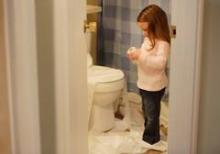One of the problems that evokes consternation in doctors and parents alike is stool refusal in an otherwise normal child. While you may be completely comfortable solving problems of encopresis in school-aged children, the recalcitrant preschooler who will urinate in a toilet or potty chair but simply won’t deliver a poop there brings parents to their knees. They imagine their dreams of Harvard going down the drain – instead of the stools that belong there. On a more practical level, that pricey deposit for preschool, or any preschool attendance at all, appears to be on the line, making parents do desperate things.
The usual scenario for stool refusal is a bright 3- to 4-year-old who has succeeded in using the potty a few times and then simply stops using it for stools. Urination in the toilet may or may not continue, but when it comes time to defecate, the child either hides behind the sofa or demands a diaper.
Sometimes stool refusal presents with the child assuming an arching rigid posture. This has brought families to me as a consultant with concern about possible seizures or other serious medical conditions such as a bowel stricture. It looks to the parents as though the child is trying his best to get the stool out when in fact it is a valiant effort to keep it in.
The reason this syndrome is called stool refusal instead of encopresis is that it occurs only in children younger than the cutoff of a mental age of 4 years. While you might consider this a failure of "toilet learning," these children understand completely what is expected of them in the area of using the potty. They show this knowledge and the presence of the neurological integrity needed to control voids by successfully urinating in the toilet.
How much easier it would be to just finish the job! What are they thinking?! Thinking is exactly part of the problem in stool refusal.
Some children develop stool refusal after having a painful poop due to constipation, diaper rash, or diarrhea. It seems that they decide, "Well, if it’s going to hurt, I’m just not going to poop anymore!" The subsequent withholding of stools then makes them harder, larger, and more painful, confirming their fears and strengthening their determination. Logical arguments about the inevitability of defecation do not prevail with preschoolers.
Sometimes stool refusal develops during that predictable period of oppositionality around 2 to 2.5 years. Anna Freud – yes, indeed, the daughter of Sigmund – was interested in the development of toileting control, and described one of the essential ingredients to toileting success as being "the child’s desire to please the parent." She even wisely recommended that teaching this task should not be undertaken when the child is in a phase of resisting every other command the parent makes! This advice is often forgotten in the urgency of the mother’s desire to return to the workplace or enroll the child in a particularly desirable day care. As the famous Dr. Barry Zuckerman points out, the anus is one of the "five orifices only the child can control" (two eyes, one mouth, urethra, and anus). If there is to be a control battle between parent and child, going to sleep, eating, and voiding are likely to be the battlefields.
The child’s own ideas about growing up are often captured in this huge social milestone. Parents may even feed into the refusal by exhorting the child to be a "Big Girl" and use the potty so that she can go to school, when the child herself would much rather stay home with mommy!
Some children develop fear of the toilet after a scary slip inside a seat not designed for tiny buttocks or when the automatic flush mechanism at a public restroom triggers a torrent (which is easily avoided by placing a sticky note over the electric eye).
Some children suddenly refuse to poop in the toilet as they become aware that things that go down the toilet never come back. That is one reason they are fascinated – or even obsessed – with flushing the toilet over and over again: It’s like watching a horror movie. And they are being asked to take that lovely poop, apparently so treasured by parents and grandparents as to elicit praise and presents, and make it disappear!


